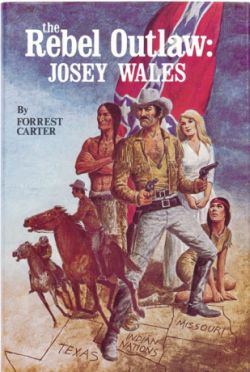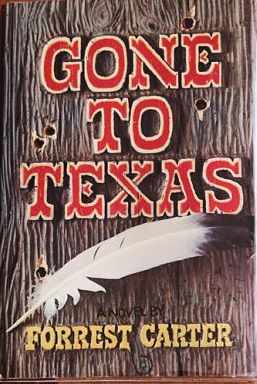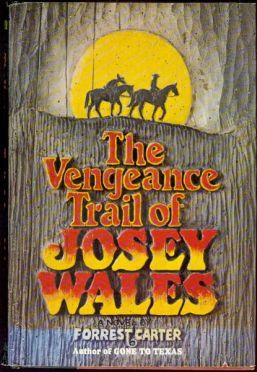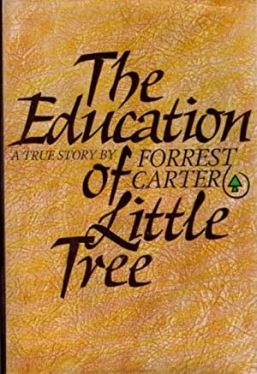 Alabama native Asa Carter was a home-grown American fascist and anti-Semite, founder of the Ku Klux Klan of the Confederacy, right-wing radio announcer, publisher of the segregationist newsletter “Southerner”, and secret author of the famous 1963 speech by Gov. George Wallace of Alabama: ‘Segregation now…segregation tomorrow…segregation forever.’
Alabama native Asa Carter was a home-grown American fascist and anti-Semite, founder of the Ku Klux Klan of the Confederacy, right-wing radio announcer, publisher of the segregationist newsletter “Southerner”, and secret author of the famous 1963 speech by Gov. George Wallace of Alabama: ‘Segregation now…segregation tomorrow…segregation forever.’
Forrest Carter’s first book The Rebel Outlaw: Josey Wales, published in 1973, became the basis for the Clint Eastwood movie “The Outlaw Josey Wales”, which was released in 1976. It is recognized today as one of the last great Westerns, which served as an important insight into the evolution of the portrayal of the Old West. Carter’s second book, The Education of Little Tree, a fictional memoir of Asa Earl Carter, an orphaned boy raised by his paternal Scottish-descent grandfather and Cherokee grandmother in the Great Smoky Mountains, was also released in 1976 by Delacorte Press. From the blurb on the back of the book: “…his Indian name is Little Tree, and the adventures and education of Little Tree are his own. He has been a cowhand all over the South and Southwest, with his main interest always remaining the history of his people.”1 The book received the ABBY award from the American Booksellers Association, and later on in 1997, was adapted as the screenplay of the film by the same name.
 Whether a double identity or a case of fake identity, one thing is quite clear: Forrest Carter was, in reality, Asa Carter, and he was no Native American, but rather a white-supremacist with a history of violence and racist beliefs. In 1979, he was choked to death by his own grown son after a drunken fistfight, leaving many unanswered questions as to his true motivations and beliefs.
Whether a double identity or a case of fake identity, one thing is quite clear: Forrest Carter was, in reality, Asa Carter, and he was no Native American, but rather a white-supremacist with a history of violence and racist beliefs. In 1979, he was choked to death by his own grown son after a drunken fistfight, leaving many unanswered questions as to his true motivations and beliefs.
The Rebel Outlaw: Josey Wales was privately printed by Whipporwill Press – a press that had previously devoted all its efforts to printing racist pamphlets. It was subsequently published by Delacorte Press as Gone to Texas, during the same year, 1973. Both editions are very scarce, with the Whipporwill Press copies asking close to five figures, while the first printing of the Delacorte Press edition, without defects sells for close to four figures in US dollars.
In 1986, seven years after the author’s death, the University of New Mexico bought the rights to publish The Education of Little Tree. The University managed to turn the book to a success, selling over 2 million copies and reaching #1 on the New York Times nonfiction bestseller list by October 4, 1991. It was promoted by the University as a biography of an Indian boy with the blurb on the back cover: “…Self-educated, Carter drew material for his books from his kin, from his Indian friends, and from a diary his great-grandmother kept during the reconstruction period.…”2 3 The 1976 first edition of the book was published by Delacorte Press, and copies of this edition are also quite scarce but remain relatively quite inexpensive with asking prices around $100.
What factors may be at play causing a tenfold price difference between Gone to Texas and The Education of Little Tree? After all, they are both first printings by the same author, same publisher imprint, and both have attractive stories with corresponding film adaptations. Gone to Texas was the first book by the author preceding the The Education of Little Tree by 3 years, but that alone could not account for the big difference in valuation. In fact, the sequel to Gone to Texas titled The Vengeance Trail of Josey Wales, which was published during the same year as Little Tree, sells for triple the price of Little Tree.
 A much more significant factor influencing collector interest is the association of Carter’s book to Clint Eastwood, the Academy Award winner and contributor to over 50 films over his career as actor, director, producer, and composer. The film, “The Outlaw Josey Wales”, earned Eastwood his first Academy Award nomination. At the time that the film was produced, Eastwood did not know of Carter’s past as a Klansman and rabid segregationist. Carter’s sequel The Vengeance Trail of Josey Wales, which was originally planned by Clint Eastwood as a film project was eventually cancelled. Perhaps he wanted to remain the good guy after finding out who the bad guy was. And for book collectors, a few more rare books to look for.
A much more significant factor influencing collector interest is the association of Carter’s book to Clint Eastwood, the Academy Award winner and contributor to over 50 films over his career as actor, director, producer, and composer. The film, “The Outlaw Josey Wales”, earned Eastwood his first Academy Award nomination. At the time that the film was produced, Eastwood did not know of Carter’s past as a Klansman and rabid segregationist. Carter’s sequel The Vengeance Trail of Josey Wales, which was originally planned by Clint Eastwood as a film project was eventually cancelled. Perhaps he wanted to remain the good guy after finding out who the bad guy was. And for book collectors, a few more rare books to look for.
1 Carter, Forrest 1976, The Education of Little Tree, Delacorte Press, New York City.
2 Carter, Forrest 1986, The Education of Little Tree, University of New Mexico, Albuquerque.
3 Browder, Laura 1986, The Curious Case of Asa Carter and The Education of Little Tree, In American Indians and Popular Culture, edited by Elizabeth DeLaney Hoffman, 63-79. Santa Barbara, CA: Praeger, 2012.


{ 0 comments… add one now }